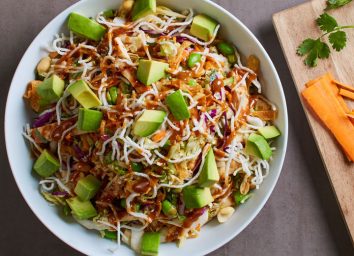Do You Really Need to Quit Sugar in Order to Eat Healthier?

Every new year, you're bombarded with an endless amount of dos and don'ts to eating healthier and becoming the best version of yourself. And typically, there's one thing that's always at the top of the naughty list: sugar. But while it's been demonized for years, it's actually not quite the monster it's made out to be. And that brings up the big question: do you really need to quit sugar completely in order to eat healthier?
Because of all the negative headlines, it's easy to get triggered every time you see the word "sugar." It's the ingredient that's been said to be responsible for the obesity epidemic, and experts have said it's as addictive as drugs, after all. Here's the deal, though: In reality, not all sugar is horrible, and thinking so could actually do more harm than good for your health.
All sugar isn't created equal.
It might come as a surprise, but it's actually best not to cut sugar completely out of your diet. Even though the world has been trained to see a candy bar and a bowl of strawberries as equally horrible when it comes to their high amounts of sugar, they impact your body in very different ways.
"There are two types of sugar: naturally-occurring sugar and added sugar. When we talk about limiting sugar for overall health, we're really concerned about sugar that's added," says Amy Gorin, MS, RDN, owner of Amy Gorin Nutrition in the New York City area. "Naturally-occurring sugars—like those found in fruit and even vegetables like sweet potatoes—are important parts of a healthy, balanced diet and provide plenty of vitamins, minerals, and other nutrients."
In fact, getting your daily intake of naturally-occurring sugar is crucial for all the cells and organs in your body: "Our body needs glucose—a simple sugar—which is the only form of energy it can burn," says Diane L. Danchi, RD, LDN, of UNC REX Healthcare in Raleigh, NC. "Glucose comes from carbohydrates found as natural sugars in fruit, dairy, vegetables, and as starches in grains. The key is to eat foods that are natural and unrefined to get the healthy sources of carbohydrates and the 'sugars' our body needs."

But while you want those wholesome sources on your plate, Danchi says added sugar should be limited to no more than 6 teaspoons per day for women and 9 teaspoons for men. That's not just sugar you're personally adding into your meals, either: It's also the sugar that companies sneak into processed foods, like pasta sauces, bread, and salad dressing. So yes, checking nutrition labels is actually super important.
"Added sugar is refined, provides zero nutrition, and is inflammatory to the body," Danchi says. "Inflammation is the body's normal response to an injury, virus, or bacteria, and unhealthy dietary ingredients like added sugar can cause a chronic state of inflammation that damages cells and is in the seedbed for diseases like Alzheimer's, hypertension, cancer, heart disease, and diabetes."
Aside from playing a role in chronic diseases, eating high amounts of added sugar can also cause obesity and dental problems. But there's a daily allotment for a reason: You don't need to completely forbid yourself from it in order to stay healthy.
How to actually eat healthier—(some) sugar, included.
Humans aren't perfect, and treating yourself to a little sugar isn't going to kill you. But cutting back to those smaller portions—and instead, swapping in foods that provide sweetness naturally—certainly helps you improve your health overall.
"When you limit added sugars, you're taking in more of your diet from foods that can provide a benefit to your health," Gorin says. "An orange, for example, contains naturally-occurring sugar, fiber, vitamin C, and other nutrients. But you're not getting those added benefits from table sugar."
Really, the best way you can better your overall health is to simply eat more vegetables and fruit. Yep, the same thing your mom always told you growing up that no kid ever wanted to hear.
"A good rule of thumb is to eat a whole, natural, plant-based diet 80 to 90 percent of the time with healthy fats and low amounts of animal fats and refined foods," Danchi says. "Avoiding sugary drinks and daily desserts on the day to day—but enjoying the special celebration food in small portions and only on occasion—is a great and workable strategy."
With a sugary treat every so often—aka not at every meal—you'll keep yourself sane. Because while some sugar can be part of the big bad, it can certainly be part of a healthy diet as well.








